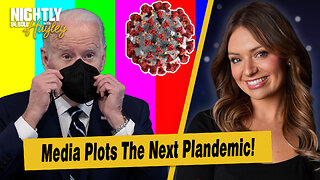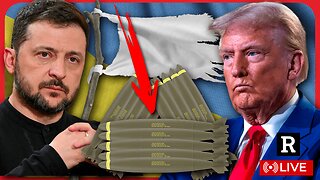Bill Gates Finally Criticizes Jabs, What's His Next Scheme?
STORY AT-A-GLANCE
In 2019, Bill Gates invested $55 million in BioNtech, which developed the COVID-19 shot for Pfizer; it’s now worth $550 million
Gates sold some of the stock at the end of 2022, when the share price was over $300
After reaping huge profits, Gates criticized COVID-19 jabs, stating they don’t block infection, aren’t effective against variants and have “very short duration”
Gates’ motivations run far deeper than making money off shrewd investments; by funding WHO, Gates is able to ensure that the decisions it makes end up profiting his own interests and those of his Big Pharma partners
Gates, via collaborations with WHO, Anthony Fauci and others, is aiming to have absolute power to control pandemic declarations and responses worldwide
In The Hill video above, Bill Gates trashes mRNA COVID-19 shots, naming three problems with them that need to be fixed. "The current vaccines are not infection-blocking," Gates says, "They're not broad — so when new variants come up you lose protection — and they have very short duration, particularly in the people who matter, which are old people."1
COVID-19 shots' lack of efficacy and safety is not news, so why is this a remarkable statement coming from Gates? He's been a major proponent of mRNA technology and invested heavily in BioNTech, which developed the COVID-19 shot for Pfizer. He's since sold a lot of those shares, earning a 10x profit.
Gates Reaps Windfall Profits From mRNA Shot Investment
As reported by The Hill co-host Briahna Joy Gray, Gates invested $55 million in BioNtech in 2019, and it's now worth $550 million. He sold some of the stock at the end of 2022, when the share price was over $300 — representing a massive gain. Co-host Robby Soave then states:2
"Let's follow that trajectory: [Gates] invests heavily in BioNTech, 'mRNA vaccines are great, this is the future,' he talks about the vaccine timeline and how we can develop it faster, 'we might have to cut some corners on safety' … All in … sells it … makes a huge amount of money … but now it's 'yeah, it's okay, it could be better, but what we really need is this breath spray.'"
Soave is referring to a statement Gates made regarding a type of inhaler that could be used "very early in an epidemic" to block people from becoming infected.3 The glaring conflict of interest is only highlighted by Gates' about-face regarding the shots.
In 2021, Gates called mRNA shots "magic" and "game changers." He's also said, "Everyone who takes the vaccine is not just protecting themselves but reducing their transmission to other people and allowing society to get back to normal."4 Contrast that with his latest statements acknowledging the shots' failures. Investigative journalist Jordan Schachtel explained:5
"Microsoft founder Bill Gates, who served as one of the architects of Covid hysteria and had more of an impact than any other individual on the disastrous global pandemic policies, has finally acknowledged that the mRNA shots he's been promoting for two years are nothing more than expired pharma junk.
Translation: Gates admits that the shots are impossible to align with rapidly developing variants, they expire in lighting speed, and they don't stop transmission. And they don't work for the only at-risk portion of the population."
Gates' major reversal on the shots comes too late, however, as his prior praises were instrumental in dictating government policy, despite his massive financial conflicts of interest. Soave adds:
"For there not to be more interrogation of his conflict of interest here by the mainstream is deeply disturbing, and for people who have been skeptical of this aspect of Pfizer and the drug development around COVID and who have been shot down in the media as kooks, anti-vaxxers and the like.
I frankly think that this issue of pharmaceutical corruption and people pushing various interventions, having an investment in profit, should have been an issue that the left was leading on.
We have to be more transparent about the fact that people who are having input in what the government policy is going to be, what's going to be required people, the Biden administration tried to require people to get this, shouldn't it be known at least when there are hundreds of millions of dollars of financial interests at stake for the people advising this? And their tune changes as it follows the money!"
Gates Games the WHO
Gates' motivations run far deeper than making money off shrewd investments. The Bill & Melinda Gates Foundation remains a primary funder of the World Health Organization (WHO), as Gates contributes via multiple avenues, including the Bill & Melinda Gates Foundation, the vaccine alliance GAVI, the Strategic Advisory Group of Experts (SAGE), UNICEF and Rotary International.
In 2017, Politico wrote a highly-critical article about Gates' undue financial influence over the WHO's operations, which Politico said was causing the agency to spend:6
"… a disproportionate amount of its resources on projects with the measurable outcomes Gates prefers … Some health advocates fear that because the Gates Foundation's money comes from investments in big business, it could serve as a Trojan horse for corporate interests to undermine WHO's role in setting standards and shaping health policies."
Indeed, as noted by Robert F. Kennedy Jr. in his book "Vax-Unvax," "The sheer magnitude of his foundation's financial contributions has made Bill Gates an unofficial — albeit unelected — leader of the WHO."7 And, in that role, Gates is able to ensure that the decisions the WHO makes end up profiting his own interests and those of his Big Pharma partners.
You may remember that, in 2019, Johns Hopkins Center for Health Security, the World Economic Forum (WEF) and the Bill and Melinda Gates Foundation sponsored a novel coronavirus pandemic preparedness exercise shortly before the pandemic started.
The event, which took place October 18, 2019 in New York, was called Event 201, and it included a detailed simulation of a coronavirus outbreak with a predicted global death toll of 65 million people within a span of 18 months.8
October 23, 2022, Gates, Johns Hopkins and the WHO cohosted another exercise, this one dubbed "Catastrophic Contagion,"9 which involved a novel pathogen called "severe epidemic enterovirus respiratory syndrome 2025" (SEERS-25) that primarily kills children.
So, we can already begin to predict what the next pandemic will revolve around, and with WHO aiming to have absolute power to control pandemic declarations and responses worldwide, it paves the way to usher in the next phases of The Great Reset and Fourth Industrial Revolution.
According to the CDC mRNA vaccines do not contain any live virus. Instead, they work by teaching our cells to make a harmless piece of a “spike protein,” which is found on the surface of the virus that causes COVID-19. After making the protein piece, cells display it on their surface. Our immune system then recognizes that it does not belong there and responds to get rid of it. When an immune response begins, antibodies are produced, creating the same response that happens in a natural infection.
In contrast to mRNA vaccines, many other vaccines use a piece of, or weakened version of, the germ that the vaccine protects against. This is how the measles and flu vaccines work. When a weakened or small part of the virus is introduced to your body, you make antibodies to help protect against future infection. Both messenger RNA (mRNA) and viral vector COVID-19 vaccines work by delivering instructions (genetic material) to our cells to start building protection against the virus that causes COVID-19.
After the body produces an immune response, it discards all the vaccine ingredients just as it would discard any information that cells no longer need. This process is a part of normal body functioning.
The genetic material delivered by mRNA vaccines never enters the nucleus of your cells, which is where your DNA is kept. Viral vector COVID-19 vaccines deliver genetic material to the cell nucleus to allow our cells to build protection against COVID-19. However, the vector virus does not have the machinery needed to integrate its genetic material into our DNA, so it cannot alter our DNA. According to the CDC all COVID-19 vaccines currently available in the United States are effective at preventing COVID-19. Getting sick with COVID-19 can offer some protection from future illness, sometimes called “natural immunity,” but the level of protection people get from having COVID-19 may vary depending on how mild or severe their illness was, the time since their infection, and their age.
Getting a COVID-19 vaccination is also a safer way to build protection than getting sick with COVID-19. COVID-19 vaccination helps protect you by creating an antibody response without you having to experience sickness. Getting vaccinated yourself may also protect people around you, particularly people at increased risk for severe illness from COVID-19. Getting sick with COVID-19 can cause severe illness or death, and we can’t reliably predict who will have mild or severe illness. If you get sick, you can spread COVID-19 to others. You can also continue to have long-term health issues after COVID-19 infection.
While COVID-19 vaccines are effective, studies have shown some declines in vaccine effectiveness against infections over time, especially when the Delta variant was circulating widely.
-
0/2000
-
 4:53
4:53
OUR LIVES TODAY
6 days ago13-year-old Battling Brain Cancer DJ Daniel Honored by President Trump During his Speech, then Visits With WarRoom’s Natalie Winters at the White House
1221 -
 33:23
33:23
Adam Carolla
4 hours ago $6.83 earnedBorder Patrol Agent in Hot Water & Whoopi’s Dumbest Take Yet | The Adam Carolla | #news
18.3K8 -
 2:41:35
2:41:35
TimcastIRL
8 hours agoUSAID Orders Staff To SHRED & BURN ALL Documents, Deep State COVER UP w/Bubba Clem| Timcast IRL
180K77 -
 1:45:39
1:45:39
Kim Iversen
10 hours agoTrump Attacks Thomas Massie—But MAGA Isn’t Having It! Is Trump Picking the Wrong Fight?
68.2K123 -
 56:31
56:31
Glenn Greenwald
9 hours agoUNLOCKED EPISODE: On Europe’s Emergency Defense Summit, the Future of Independent Media, Speech Crackdowns and More
120K54 -
 43:48
43:48
BonginoReport
11 hours agoMainstream Media Plots The Next Plandemic! (Ep.02) - 03/11/2025
157K303 -
 1:13:13
1:13:13
Michael Franzese
11 hours agoMegyn Kelly’s UNFILTERED Take on The Ukraine War, Trump & Modern Masculinity
118K48 -
 1:43:21
1:43:21
Redacted News
12 hours agoBREAKING! UKRAINE AGREES TO CEASEFIRE WITH RUSSIA... BUT THERE'S A BIG CATCH | Redacted News
201K339 -
 58:17
58:17
Candace Show Podcast
12 hours agoShould We Feel Bad For Blake Lively? | Candace Ep 157
169K338 -
 3:06:52
3:06:52
The Nerd Realm
13 hours ago $12.30 earnedHollow Knight Voidheart Edition #19 | Nerd Realm Playthrough
101K5

0 Comments